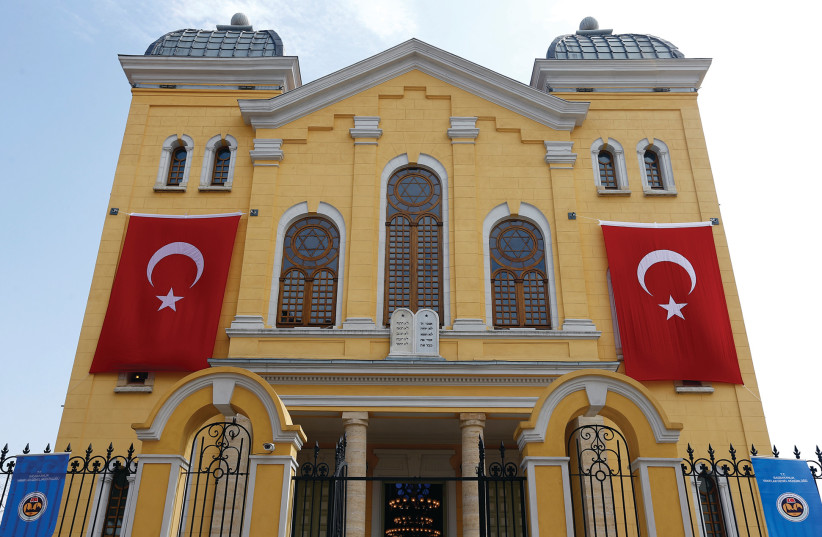Israel and Turkey have already stopped several attempts by Iran-backed terrorists to attack Israelis, Prime Minister Naftali Bennett said Monday.
“The operational efforts with the Turkish security forces have borne fruit,” he said in a press briefing. “In recent days, in a joint Israeli-Turkish effort, we thwarted a number of terrorist attempts, and numerous terrorists were arrested on Turkish ground.”
“In recent days, in a joint Israeli-Turkish effort, we thwarted a number of terrorist attempts and numerous terrorists were arrested on Turkish ground.”
Prime Minister Naftali Bennett
Bennett said Israel and Turkey were working together very closely to stop Iran’s attempt to harm Israelis and Jews. He thanked Turkish President Recep Tayyip Erdogan for his efforts.
His remarks came as the National Security Council maintained its highest-level warning against Israelis visiting Turkey, especially Istanbul, in light of attempts by Iran to kill or kidnap Israeli civilians.
“We are continuing to work together with the goal of bringing the situation in Turkey and Israeli tourism back to normal,” Bennett said. “We have to finish the counterterrorism operations.”

Israel will “continue to expose Iran’s true face,” he said, adding that there will be consequences for anyone who tries to hurt Israelis.
“The days in which [Iran] funded terrorism, equips terrorists, trains and sends them and is left unscathed are over,” Bennett said. “Now, the one sending [terrorists] pays. We will go anywhere we need to.”
Regarding Iran’s nuclear program, he said: “The central goal of [US President Joe Biden’s] visit [to Israel next month] is to lock down a clear shared plan of action... to stop Iran from becoming a nuclear power.”
Bennett said he viewed the International Atomic Energy Agency Board of Governor’s resolution against Iran from the beginning of the month as “sharper than anything in a long time” and an indication that “the world is awakening to Iran’s true face.”
In the short term, Israel wants to stop Iran from continuing to enrich uranium and develop a nuclear bomb through “diplomatic and other tools,” Bennett said.
“Iran will come to understand that at the moment, in the no-deal reality, we won,” he said. “We had a goal for there not to be an agreement... but at the same time, there was to be a stop sign in front of Iran.”
Regarding Israel’s long-term plan, Bennett confirmed past reporting by The Jerusalem Post that Israel would like to see an Iran nuclear agreement that would permanently stop its nuclear program. That means it would not have the 2015 deal’s “sunset clauses” that gradually lift the restrictions on Iran’s nuclear program.
In addition, Israel is working with moderates in the region against Iran, Bennett said.
“We are slowly starting to see before our eyes a united and stronger Middle East,” he said. “In that framework, the State of Israel is stronger and safer. Israel’s regional stance continues to improve. We have a very warm policy of goodwill. Every minister is working in his area to keep up the momentum that began with the Abraham Accords.”
In light of the US asking for gestures toward the Palestinians ahead of Biden’s visit, a diplomatic source said Bennett is willing to take steps that would improve the Palestinian economy, but no specific ones have been finalized yet.
The suggestion to allow Palestinians to staff the Allenby crossing will not be approved as long as it has political implications, the source said, confirming earlier reporting in the Post, but if there are economic aspects, it can be done.
The delay in razing a terrorist’s home until after Biden’s visit is meant to maintain calm, and the demolition can happen days after he departs, the source said.
Regarding the situation in the Gaza Strip, Bennett said this has been the quietest year for residents of the South since Israel evacuated the coastal enclave in 2005, and Hamas is rearming itself much more slowly than it has in the past. Egypt has helped significantly on that front by tightening control of the Rafah crossing, he said.
Israel reaffirmed its deterrence against Hamas by stopping the transfer of suitcases of cash to Gaza; by responding to every projectile launched into Israel, even incendiary balloons; by standing up to explicit threats by Hamas, for example, by allowing the Flag March on Jerusalem Day, despite Hamas saying it would attack; and by allowing Gazan workers into Israel, Bennett said.
“I have an approach of a heavy hand against Hamas and a hand extended to the residents,” he said. “There is a danger that one of the workers [from Gaza] will commit a terrorist attack, but the strategic upside is much greater... We always punish them when the situation worsens, but if we have a month of quiet, I will bring in more workers.”
The average salary in Israel is about 10 times more than in Gaza, and this way they are earning money rather than receiving handouts, Bennett said.
Also on Monday, National Security Adviser Eyal Hulata made a diplomatic visit to Jordan.
